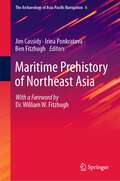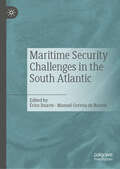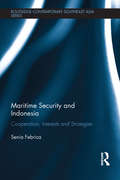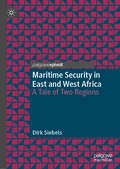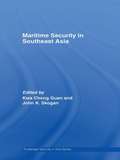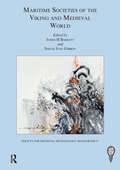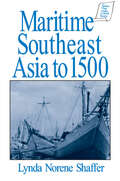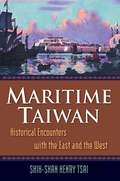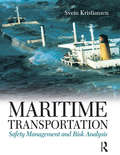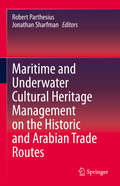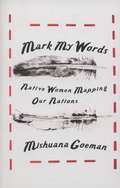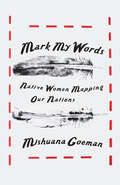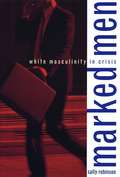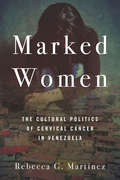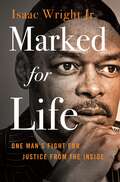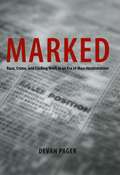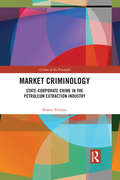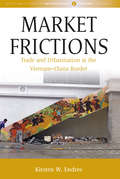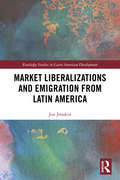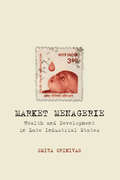- Table View
- List View
Maritime Prehistory of Northeast Asia: With a Foreword by Dr. William W. Fitzhugh (The Archaeology of Asia-Pacific Navigation #6)
by Ben Fitzhugh Jim Cassidy Irina PonkratovaThis book addresses a void in the synthetic archaeological knowledge of the North Pacific by enabling a more informed evaluation of North Pacific Rim seafaring hypotheses. It answers questions about intra- and inter-regional relationships in the evolution of maritime adaptations throughout the region. The authors collectively address evidence of aquatic activities during the Late Pleistocene and Holocene in the Sea of Japan, Sea of Okhotsk and adjacent coastal areas of Korea, Japan, Sakhalin Island, the Kurile Islands and the Russian Far East with syntheses placing the region into a larger North Pacific context. This examination provides essential data on human modes of terrestrial adaptation and the transition to maritime lifeways over the last 40,000 years. It also provides a much-needed foundation to better understand the peopling of the New World 17,000 years ago, either by a pedestrian transit or through the use of watercraft, or more likely a combination of the two. As one of the first publications on the prehistory of the maritime region of Northeast Asia provided in English, with contributions by leading Korean, Japanese, Russian, Canadian, European and US-based researchers of the region, this volume presents a means for archaeologists to assess proposed hypotheses pertaining to late Pleistocene and Holocene seafaring around the North Pacific Rim. It is an essential read for specialists in history, archaeology, behavioural ecology and maritime evolution.
Maritime Security Challenges in the South Atlantic
by Érico Duarte Manuel Correia de BarrosThis edited volume focuses on the South Atlantic regional and national issues with maritime implications: naval policy, security, transnational organized crime, and Europe's legacy and current influence. The work analyzes the positions in favor and against NATO’s extended role in the South Atlantic, the historical and current issues related to the Falklands War, the African national deficits, and initiatives to attend the regional maritime problems. Including contributions from Angolan, Brazilian, Senegalese, and US collaborators, the volume offers eclectic conceptual frameworks, rich historical backgrounds, updated data, original analysis models, and policy recommendations.
Maritime Security and Indonesia: Cooperation, Interests and Strategies (Routledge Contemporary Southeast Asia Series)
by Senia FebricaIndonesia is the largest archipelago state in the world comprising 17,480 islands, with a maritime territory measuring close to 6 million square kilometres. It is located between the two key shipping routes of the Pacific and Indian Ocean. Indonesia’s cooperation in maritime security initiatives is vitally important because half of the world’s trading goods and oil pass through Indonesian waters, including the Straits of Malacca, the Strait of Sunda and the Strait of Lombok. This book analyses Indonesia’s participation in international maritime security cooperation. Using Indonesia as a case study, the book adopts mixed methods to assess emerging power cooperation and non-cooperation drawing from various International Relations theories and the bureaucratic politics approach. It addresses not only the topic of Indonesia’s cooperation but also engages in debates across the International Relations, political science and policy studies disciplines regarding state cooperation. Based on extensive primary Indonesian language sources and original interviews, the author offers a conceptual discussion on the reasons underlying emerging middle power participation or non-participation in cooperation agreements. The analysis offers a fresh perspective on the growing problems of maritime terrorism and sea robbery and how an emerging power deals with these threats at unilateral, bilateral, regional and multilateral levels. The book fills a significant gap in literature on Indonesian foreign policy making in the post-1998 era. It provides the first in-depth study of Indonesia’s decision making process in the area of maritime security and will thus be of interest to researchers in the field of comparative politics, international relations, security policy, maritime cooperation, port and shipping businesses and Southeast Asian politics and society.
Maritime Security in East and West Africa: A Tale of Two Regions
by Dirk SiebelsThis book examines the nexus between maritime security and the ‘blue economy’ in sub-Saharan Africa. In recent years, maritime security issues have received increasing attention, but academic and policy-related discussions are largely limited to counter-piracy operations and, to a smaller extent, problems related to illegal fishing. This project offers an essential addition to the current academic and political discourse, combining a broad range of statistics with primary research and findings from more than 40 interviews with key stakeholders. It provides a unique analysis, recognizing that maritime security is not an end in itself but rather linked to economic and immaterial benefits of a more secure environment at sea.
Maritime Security in Southeast Asia (Routledge Security in Asia Series)
by Kwa Chong Guan John K. SkoganThis book confronts both the maritime security challenges and responses. In Southeast Asia, maritime security has, over the last twenty years, taken on a much greater importance, due to the Law of the Sea convention, which has resulted in a 200 nautical mile Exclusive Economic Zones (EEZs). As well as traditional security threats to maritime security, there has also emerged a range of non-traditional threat, such as those emanating from piracy and international terrorism that spill over into the maritime domain. Events such as September 11th, and the designation of Southeast Asia as a 'second front' in the war against terrorism, have resulted in the growing realization that multilateral security cooperation is required in order to better manage emerging security threats. Expert contributors to this book identify the nature of the maritime security problem and critically evaluate the various responses with an eye to improving the management of prevailing and emerging security threats. This book will be an invaluable resource to academics, policy analysts, legislators and students interested in security issues in Southeast Asia.
Maritime Societies of the Viking and Medieval World (The Society for Medieval Archaeology Monographs)
by Sarah Jane Gibbon James H BarrettThis book is a study of communities that drew their identity and livelihood from their relationships with water during a pivotal time in the creation of the social, economic and political landscapes of northern Europe. It focuses on the Baltic, North and Irish Seas in the Viking Age (ad 1050–1200), with a few later examples (such as the Scottish Lordship of the Isles) included to help illuminate less well-documented earlier centuries. Individual chapters introduce maritime worlds ranging from the Isle of Man to Gotland — while also touching on the relationships between estate centres, towns, landing places and the sea in the more terrestrially oriented societies that surrounded northern Europe’s main spheres of maritime interaction. It is predominately an archaeological project, but draws no arbitrary lines between the fields of historical archaeology, history and literature. The volume explores the complex relationships between long-range interconnections and distinctive regional identities that are characteristic of maritime societies, seeking to understand communities that were brought into being by their relationships with the sea and who set waves in motion that altered distant shores.
Maritime Southeast Asia to 500
by Lynda Norene ShafferA history of the fabled islands of Southeast Asia from 300 BC, by which time their inhabitants had learned to sail the monsoon winds, to AD 1528, when Islam became dominant in the region.
Maritime Taiwan: Historical Encounters with the East and the West
by Shih-Shan Henry TsaiFor centuries the island of Taiwan, 100 miles off the Asian mainland, has been a crossroads for traders and settlers, pirates and military schemers from around the world. Unlike China, with its long tradition of keeping foreigners out, Taiwan has a long history of interaction, both hostile and friendly, with other seafaring nations near and far. "Maritime Taiwan" captures the full drama and details of this remarkable history. It's filled with fascinating stories of foreign adventurers and echoes the bitter songs of Taiwan's aboriginal population, confronted by the convergence of different maritime cultures and values on the island.Here are accounts of the legendary pirate Koxinga, the Chinese junk trade, the mighty Dutch East India Company, British opium traders and Scottish tea merchants, Jesuit priests and Presbyterian missionaries, A French fleet commander, a Japanese colonial administrator, an American aid official, and many more. Here too is an extraordinary view of Taiwan over the centuries, as its distinct identity, culture, and values were shaped by its unique history. Today, with a population of only 23 million, Taiwan is the world's nineteenth largest economy, a vibrant, relatively free society on the strategic route between China and Southeast Asia. Maritime Taiwan also discusses the significant impact of American military, economic, educational, and technological aid on Taiwan's developments and addresses the island's continued importance in maintaining the U.S. hegemony in East Asia.
Maritime Transportation: Safety Management And Risk Analysis
by Svein KristiansenFirst Published in 2005. Routledge is an imprint of Taylor & Francis, an informa company.
Maritime and Underwater Cultural Heritage Management on the Historic and Arabian Trade Routes
by Robert Parthesius Jonathan SharfmanThis book brings together perspectives on maritime and underwater cultural heritage (MUCH) in selected countries around the Indian Ocean rim that are linked by the historic and Arabian maritime trade routes. It explores how selected countries have adapted maritime archaeological and UCH management methodologies rooted in western contexts to their own situations. It assesses how new heritage management burdens have been placed on states by outsiders wishing to conserve their own heritage in foreign waters. It investigates what these new pressures are and asks what the future holds for the region. Each chapter outlines the development of MUCH in the author’s home nation, provides an overview of current frameworks and activities, and looks to the future of research and management. The chapters draw conclusions regarding what has driven the process of developing individual approaches and perspectives and what the results have been. They ask if the focus is on management or research, and if the MUCH vision is focused seaward or towards the hinterland. A common thread that binds the chapters is the adaptation of western management and practice structures to contexts where the binaries such as tangible and intangible, natural and cultural, and submerged and terrestrial become blurred. It examines how states have confronted management and research challenges on sites that are validated primarily by European expansion perspectives.
Marjorie Prime (TCG Edition)
by Jordan Harrison"A thought-provoking play about memory, its corruption and our insistence that technology help us outwit death."—The New York Times "It's the kind of experience that keeps unfolding in the mind long after the play is over."—Los Angeles TimesIn a future not far from our present, Marjorie spends her time rewriting her past in favor of her idealized memories, with help from the intriguingly innovative technology that allows her to do so. With deeply felt characters – both real and in the form of holograms or "Primes"—Jordan Harrison's widely acclaimed new play burrows into the most troubling questions of the digital age: are we replacing our memory with a false reality, and what does that mean about the preservation of the truth? Marjorie Prime ultimately asks whether manipulating our past is a corruption of history or a welcome consolation. Jordan Harrison's other plays include Maple and Vine, Doris to Darlene, Amazons and their Men, Act a Lady, Finn in the Underworld, Futura, Kid-Simple, The Museum Play, Standing on Ceremony, Suprema, and Fit for Feet. His children's musical, The Flea and the Professor, won the 2011 Barrymore Award for Best Production. Harrison is the recipient of a Guggenheim Fellowship, a Hodder Fellowship at Princeton University, a Theater Masters' Innovative Playwright Award, the Kesselring Prize, the Heideman Award, the Loewe Award for Musical Theater, Jerome and McKnight Fellowships from The Playwrights' Center, and a NEA/TCG Playwright-in-Residence Grant.
Mark My Words: Native Women Mapping Our Nations
by Mishuana GoemanThe book argues that it is vital to refocus the efforts of Native nations beyond replicating settler models of territory, jurisdiction, and race. Through an examination of twentieth-century Native women’s poetry and prose, Goeman illuminates how these works can serve to remap settler geographies and center Native knowledges. She positions Native women as pivotal to how our nations, both tribal and nontribal, have been imagined and mapped, and how these women play an ongoing role in decolonization. In a strong and lucid voice, Goeman provides close readings of literary texts, including those of E. Pauline Johnson, Esther Belin, Joy Harjo, Leslie Marmon Silko, and Heid Erdrich. In addition, she places these works in the framework of U.S. and Canadian Indian law and policy. Her charting of women’s struggles to define themselves and their communities reveals the significant power in all of our stories.
Mark My Words: Native Women Mapping Our Nations (First Peoples: New Directions in Indigenous Studies)
by Mishuana GoemanDominant history would have us believe that colonialism belongs to a previous era that has long come to an end. But as Native people become mobile, reservation lands become overcrowded and the state seeks to enforce means of containment, closing its borders to incoming, often indigenous, immigrants.In Mark My Words, Mishuana Goeman traces settler colonialism as an enduring form of gendered spatial violence, demonstrating how it persists in the contemporary context of neoliberal globalization. The book argues that it is vital to refocus the efforts of Native nations beyond replicating settler models of territory, jurisdiction, and race. Through an examination of twentieth-century Native women&’s poetry and prose, Goeman illuminates how these works can serve to remap settler geographies and center Native knowledges. She positions Native women as pivotal to how our nations, both tribal and nontribal, have been imagined and mapped, and how these women play an ongoing role in decolonization.In a strong and lucid voice, Goeman provides close readings of literary texts, including those of E. Pauline Johnson, Esther Belin, Joy Harjo, Leslie Marmon Silko, and Heid Erdrich. In addition, she places these works in the framework of U.S. and Canadian Indian law and policy. Her charting of women&’s struggles to define themselves and their communities reveals the significant power in all of our stories.
Marked Men: White Masculinity in Crisis
by Sally RobinsonWhite men still hold most of the political and economic cards in the United States; yet stories about wounded and traumatized men dominate popular culture. Why are white men jumping on the victim bandwagon? Examining novels by Philip Roth, John Updike, James Dickey, John Irving, and Pat Conroy and such films as Deliverance, Misery, and Dead Poets Society—as well as other writings, including The Closing of the American Mind—Sally Robinson argues that white men are tempted by the possibilities of pain and the surprisingly pleasurable tensions that come from living in crisis.
Marked Women: The Cultural Politics of Cervical Cancer in Venezuela
by Rebecca G. MartínezCervical cancer is the third leading cause of death among women in Venezuela, with poor and working-class women bearing the brunt of it. Doctors and public health officials regard promiscuity and poor hygiene—coded indicators for low class, low culture, and bad morals—as risk factors for the disease. Drawing on in-depth fieldwork conducted in two oncology hospitals in Caracas, Marked Women is an ethnography of women's experiences with cervical cancer, the doctors and nurses who treat them, and the public health officials and administrators who set up intervention programs to combat the disease. Rebecca G. Martínez contextualizes patient-doctor interactions within a historical arc of Venezuelan nationalism, modernity, neoliberalism, and Chavismo to understand the scientific, social, and political discourses surrounding the disease. The women, marked as deviant for their sexual transgressions, are not only characterized as engaging in unhygienic, uncultured, and promiscuous behaviors, but also become embodiments of these very behaviors. Ultimately, Marked Women explores how epidemiological risk is a socially, culturally, and historically embedded process—and how this enables cervical cancer to stigmatize women as socially marginal, burdens on society, and threats to the "health" of the modern nation.
Marked for Life: One Man's Fight for Justice from the Inside
by Isaac Wright Jr.An empowering memoir of courage and hope in the face of injustice—and the basis for the ABC television show, For Life—Marked for Life is the true story of Isaac Wright Jr.’s battle to win his freedom after being wrongfully imprisoned for crimes he didn’t commit, and a critical indictment of America’s judicial system.“If I waited around for someone to save me, I’d be waiting my whole life. Unless I took the reins of this thing myself, I was going to die in prison. If that was my destiny, then I was going to die fighting. The desperation of that equation kept me up most nights. I would never find a gladiator. So I had to become him.”In the summer of 1989, Isaac Wright Jr. was a 28-year-old independent music producer, who’d struck out on his own and became one of hip hop’s early success stories. With his dance crew Uptown Express, Wright won recognition on Star Search, toured with Run-DMC, and transitioned into management, co-founding his wife Sunshine’s music group, The Cover Girls. They’d settled in the New Jersey suburbs to raise their six-year-old daughter, never imagining that Wright would fall victim to gross police misconduct and a corrupt district attorney.Accused of being a drug “kingpin” and incarcerated in Somerset County while the prosecutor and police built their case of lies against him, Wright realized he would get no help from any defense attorneys—white men uninterested in uncovering the truth or in proving the innocence of a black man. Pressured to take a plea deal offer of 20 years behind bars, Wright chose to take the law into his own hands by educating himself in the legal system so he could represent himself in court.Studying statutes and cases in the jail’s law library, Wright became an adept legal mind. But despite acquiring knowledge that he put to use in defending his fellow inmates, he lost his trial and was sentenced to Trenton State Prison for life, plus 70 years in 1991. For the next five years, Wright would continue learning law, become a paralegal with the prison’s Inmate Legal Association, and appeal his case. Threatened by corrupt correction officers and convicts, his family falling apart, Wright fought for his life with every legal means at his disposal, eventually uncovering the smoking gun that unraveled the conspiracy perpetrated by law enforcement officials against him.Marked for Life is not just the story of how Isaac Wright Jr. won his freedom. It is the story of how he found his true calling as a gladiator fighting on behalf of the oppressed and marginalized communities victimized by an unjust system of law.
Marked: Race, Crime, and Finding Work in an Era of Mass Incarceration
by Devah PagerNearly every job application asks it: have you ever been convicted of a crime? For the hundreds of thousands of young men leaving American prisons each year, their answer to that question may determine whether they can find work and begin rebuilding their lives. The product of an innovative field experiment, Marked gives us our first real glimpse into the tremendous difficulties facing ex-offenders in the job market. Devah Pager matched up pairs of young men, randomly assigned them criminal records, then sent them on hundreds of real job searches throughout the city of Milwaukee. Her applicants were attractive, articulate, and capable- yet ex-offenders received less than half the callbacks of the equally qualified applicants without criminal backgrounds. Young black men, meanwhile, paid a particularly high price: those with clean records fared no better in their job searches than white men just out of prison. Such shocking barriers to legitimate work, Pager contends, are an important reason that many ex-prisoners soon find themselves back in the realm of poverty, underground employment, and crime that led them to prison in the first place. "Using scholarly research, field research in Milwaukee, and graphics, [Pager] shows that ex-offenders, white or black, stand a very poor chance of getting a legitimate job... Both informative and convincing. "--Library Journal "Marked is that rare book: a penetrating text that rings with moral concern couched in vivid prose--and one of the most useful sociological studies in years. "--Michael Eric Dyson
Marked: Race, Crime, and Finding Work in an Era of Mass Incarceration
by Devah PagerNearly every job application asks it: have you ever been convicted of a crime? For the hundreds of thousands of young men leaving American prisons each year, their answer to that question may determine whether they can find work and begin rebuilding their lives. The product of an innovative field experiment, Marked gives us our first real glimpse into the tremendous difficulties facing ex-offenders in the job market. Devah Pager matched up pairs of young men, randomly assigned them criminal records, then sent them on hundreds of real job searches throughout the city of Milwaukee. Her applicants were attractive, articulate, and capable—yet ex-offenders received less than half the callbacks of the equally qualified applicants without criminal backgrounds. Young black men, meanwhile, paid a particularly high price: those with clean records fared no better in their job searches than white men just out of prison. Such shocking barriers to legitimate work, Pager contends, are an important reason that many ex-prisoners soon find themselves back in the realm of poverty, underground employment, and crime that led them to prison in the first place. “Using scholarly research, field research in Milwaukee, and graphics, [Pager] shows that ex-offenders, white or black, stand a very poor chance of getting a legitimate job. . . . Both informative and convincing.”—Library Journal“Marked is that rare book: a penetrating text that rings with moral concern couched in vivid prose—and one of the most useful sociological studies in years.”—Michael Eric Dyson
Market Criminology: State-Corporate Crime in the Petroleum Extraction Industry (Crimes of the Powerful)
by Ifeanyi EzeonuBuilding on original research into the petroleum industry and on the theory of crimes of globalization, this book introduces the concept of Market Criminology: the criminology of preventable market-generated harms and the criminogenic effects of market rationality in variegated forms of capitalism. Ifeanyi Ezeonu explores the ascendance of the fundamentalist form of market economy in Nigeria; the complicity of the state political and security apparatuses in the corporate expropriation of the country's petroleum resource wealth; the deleterious effects of this neoliberal architecture on the local population, as well as community resistance strategies over the years. This book offers a major contribution to research on state-corporate crime and the crimes of the powerful. Key reading for scholars and students in the areas of criminology, international political economy and sociology, this book will also be rich resource for researchers and non-governmental agencies working in the areas of environmental protection, human rights and sustainable development in the Global South, especially the Sub-Saharan Africa.
Market Dreams: Gender, Class, and Capitalism in the Czech Republic
by Elaine WeinerDrawing on a rich trove of focus group data, interviews, and textual sources, Elaine Weiner'sMarket Dreamspowerfully captures the varied responses of female managers and factory workers in the Czech Republic to their country's transition from socialism to capitalism. Her work, rooted in sociology and comparative feminism, is an important advance for the literature on women in Eastern Europe. "Market Dreamsis a conceptually-sophisticated and empirically-rich account of how the discourses and practices of the free market penetrated the hearts and minds of everyday Czech citizens. Weiner's provocative analysis takes readers inside the worlds of female factory workers to expose the discontinuities between their radiant market dreams and their everyday realities--and juxtaposes them to the continuities experienced by female managers. In the process, it challenges many of our ideas about post/socialism, marketization, and gender and reveals the enduring power of stories in shaping social identities and actions. " ---Lynne Haney, Associate Professor of Sociology, New York University "Through interviews and a careful analysis of newspaper articles written in the first decade after the collapse of state socialism, Weiner explores the complicated interconnections between personal stories and the emerging neoliberal metanarrative of the free market in the Czech Republic after 1989. Her book transcends many of the dichotomies with which researchers of post-state socialism have been struggling: 'East' vs. 'West,' losers and winners, emancipation vs. oppression, etc. , and thus makes a truly novel contribution to our understanding of women's lives after state socialism. " ---Éva Fodor, Assistant Professor of Gender Studies, Central European University "Weiner's rich and innovative study of female Czech managers and workers exemplifies the importance of narrative analysis for understanding why gender and class have not (yet) reconfigured the sense of postcommunism's alternatives. This is critical reading for feminists, class analysts, and students of postcommunist social change. " ---Michael Kennedy, Director, Center for European Studies, University of Michigan Elaine Weiner is Assistant Professor of Sociology at McGill University. Visit the author's website at: www. mcgill. ca/sociology/faculty/weiner/. Cover Credit: Frank Scherschel/Time & Life Pictures/Getty Images
Market Frictions: Trade and Urbanization at the Vietnam-China Border (Max Planck Studies in Anthropology and Economy #5)
by Kirsten W. EndresBased on ethnographic research conducted during several years, Market Frictions examines the tensions and frictions that emerge from the interaction of global market forces, urban planning policies, and small-scale trading activities in the Vietnamese border city of Lào Cai. Here, it is revealed how small-scale traders and market vendors experience the marketplace, reflect upon their trading activities, and negotiate current state policies and regulations. It shows how “traditional” Vietnamese marketplaces have continually been reshaped and adapted to meet the changing political-economic circumstances and civilizational ideals of the time.
Market Liberalizations and Emigration from Latin America (Routledge Studies in Latin American Development)
by Jon JonakinMarket Liberalizations and Emigration From Latin America provides a comprehensive analysis of the impact of the era of liberalization in Latin America, focusing in particular on labor markets and emigration from the region. Starting in 1980, liberalization in Latin America was expected to improve market functioning, efficiency, and welfare. Instead, it yielded slower growth, unexpectedly high levels of unemployment and income inequality, flat or falling wages, an increase in non-tradeable (service sector) and informal activity, and, finally, waves of emigration from Mexico, Central America, and Ecuador, among other countries. This book provides a heterodox narrative explanation of why the orthodox economic model that underwrote the standard ‘trickle-down’ account served more to obscure and obfuscate than to explain and clarify the state-of-affairs. The book investigates the impact of the global-scale liberalizations of markets for goods and physical and finance capital and the mere national-scale liberalization of regional labor markets, arguing that these asymmetric liberalizations, together, resulted in labor market failure and contributed in turn to the subsequent, undocumented migrant flow. The ultimate effect of the skewed scale of market liberalizations in Latin America disproportionately benefited capital at the expense of labor. Market Liberalizations and Emigration From Latin America will be of interest to researchers of economics and development in Latin America.
Market Menagerie: Health and Development in Late Industrial States
by Smita SrinivasMarket Menagerieexamines technological advance and market regulation in the health industries of nations such as India, Brazil, South Africa, Nigeria, and China. Pharmaceutical and life science industries can reinforce economic development and industry growth, but not necessarily positive health outcomes. Yet well-crafted industrial and health policies can strengthen each other and reconcile economic and social goals. This book advocates moving beyond traditional market failure to bring together three uncommonly paired themes: the growth of industrial capabilities, the politics of health access, and the geography of production and redistribution.
Market Movements: African American Involvement in School Voucher Reform (Critical Social Thought)
by Thomas C. PedroniWinner of the 2009 Critics Choice Book Award of the American Educational Studies Association (AESA) Through careful ethnographic research, Market Movements represents community leaders, school officials, and most importantly, African American working class families who have used vouchers as a means of removing their children from public schools they deemed unacceptable. The book works to discern the overlaps and tensions between the educational visions of African American voucher families and those of powerful conservative educational forces in U.S. society which purport to be allied with them. To the extent that there are points of divergence with the educational right, and points of convergence with educational progressives, this book provides a hopeful message and a practical vision. It seeks to accomplish some of the critical empirical and conceptual groundwork that is necessary in order to renew the increasingly fractious relations between those social actors—teachers, communities of color, critical researchers, and labor unions—most likely to defend and expand previous social democratic victories.
